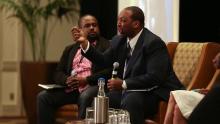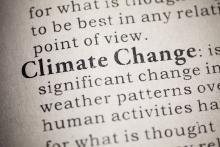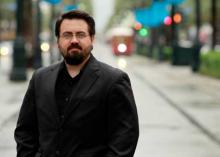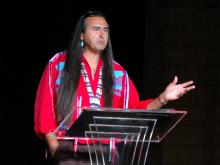leaders

Collectively, this group envisions and works toward a wide and bold church community that cares for creation, centers those who the church has historically marginalized, and holds both political and faith leaders accountable.

“We stand in a long tradition of radical hospitality. From the underground railroad to this very day, we have welcomed the stranger, sheltered the refugee, offered safe home, resisted racism, fear, and exclusion. We will not be silent if families are torn apart, children terrified, parents detained. We are not accomplices to hate or reactionary fear. Our calling is to love and justice and faithful resistance. We will open our hearts, we will open our doors, to those who face the threat of deportation. All are welcome, period.” – The Rev. Victoria Safford, lead minister, White Bear Unitarian Universalist Church, Mahtomedi, Minn.

IN THE LATE 1930s, a large swath of the American church was reluctant for the United States to become involved in another war in Europe. The memory of the Great War was too fresh; what had been intended to be “a war to end all wars,” a crusade for freedom and democracy, in hindsight just looked like senseless horror. Entire denominations committed to peace positions.
This pacifist sentiment troubled Reinhold Niebuhr, who was following the rise of Hitler and spoke out against the atrocities committed against Jews long before they had reached the national consciousness. So in 1940 Niebuhr penned an essay to rally what he saw as a disillusioned, passive church into taking concrete action for social justice. He titled the essay “Why the Christian Church is Not Pacifist” and argued that in a world marred by sin, coercion and violence were sometimes necessary to pursue justice.
After the attack on Pearl Harbor, Niebuhr’s argument against pacifism won the day; U.S. churches lined up en masse to support the war effort. Since then, many Christians have taken it for granted that violence is an unfortunate but realistic necessity if we hope to bring justice in a world where injustice is so pervasive.
Yet a survey of 20th century theology shows that many Christians have grappled with violence, justice, and the gospel and arrived at conclusions quite different from Niebuhr—and from each other. These Christian witnesses for peace include familiar voices such as Dorothy Day, Thomas Merton, Martin Luther King Jr., John Howard Yoder, and Stanley Hauerwas, but also many less well-known voices, such as the ones listed on the following pages. Examined together, these eight perspectives show that Christian nonviolence isn’t a singular position, but rather a rich conversation wrestling with what it means to live out the biblical call to justice amid the complexities of ever-changing political, social, and moral situations.
ONLY SOCIAL MOVEMENTS really change history. Developing, nurturing, and supporting a new generation of leaders is central to the long-term success of these movements. As leaders like me get older and look to the future, mentoring young leaders is particularly important. More and more of my time is spent doing that mentoring, not only broadly but in relationship to particularly promising young leaders whom I have met. It is some of the most important and enjoyable work that I do.
For many years, Sojourners called together large conferences on biblical justice and peace. Thousands of people came year after year, and many positive things happened—new relationships, connections, projects, and organizations—even marriages and families! Now, several other groups are having justice and peace conferences, which is exactly the kind of “competition” Sojourners has always hoped for.
Last year, some of our younger staff came up with a great idea—to have a leadership “Summit” for people already providing leadership for the biblical vision of justice and peace. All the participants would have to be nominated by credible leaders doing this work, and instead of Justice 101 with big speakers and standing ovations, this would become a new, creative environment for moving justice agendas forward—Justice 202. We didn’t publicly advertise these gatherings—instead, the invitation spread by word of mouth as leaders, especially younger ones, were drawn together by experienced justice leaders who nominated them.

IN APRIL, eight nations, including Iran, announced an agreement for addressing Iran’s controversial nuclear activities. The Iran Nuclear Framework, supported by many Christian leaders in the U.S., is seen as an opportunity to “dramatically restrain the capacity of Iran to acquire nuclear weapons.” It could be one of the most significant nonproliferation achievements in history.
The proposed agreement significantly reduces Iran’s capacity to enrich uranium, closes the plutonium path to weapons capacity, and greatly increases international monitoring and verification of Iran’s nuclear infrastructure. It allows for lifting sanctions against Iran and opens the door to the possibility of improved bilateral relations.
The multiyear agreement sharply curtails Iran’s enrichment program. Iran has agreed to reduce by approximately two-thirds its installed centrifuges, from about 19,000 today to 6,104 under the deal. And Iran has agreed not to build any new facilities for the purpose of enriching uranium for 15 years.

IF YOU'RE A Christian who cares about social justice, you can’t afford to ignore Texas.
In his book Rough Country, Princeton sociologist Robert Wuthnow puts it bluntly: “Texas is America’s most powerful Bible-Belt state.” Texas has the second largest population in the country, home to more than 26 million people. In 2014, Texans led six out of 21 congressional committees. And more than half of Texans attend church at least twice monthly.
No other state has more evangelical Christians than Texas. Many national Christian media companies, parachurch ministries, and influential megachurches are based in Texas. That’s why Texas is called the Buckle of the Bible Belt: It’s the most populous, wealthy, and politically powerful part of the country where evangelical churchgoing is still a dominant force.
But what if we reimagine the Bible Belt? In 2005, Texas officially became a “majority-minority” state, where traditional minority racial or ethnic groups represent more than half of the population. A majority of Texans under 40 in the pews are people of color. This creates an opportunity: Demographic change could lead to cultural change. What if we cast a new vision for faith in Texas public life that puts working families and people of color at the center?
But demographic change will not translate automatically into cultural change. The dominant historical Bible Belt narrative has influenced and shaped the identities of all Texas Christians, including in the African-American and Latino faith communities.

AS YOU READ this column, diplomats from the United States, the United Kingdom, France, Russia, China, Germany, and the European Union are working with their Iranian counterparts to finalize a deal concerning Iran’s nuclear program. I strongly believe that Christians should support the framework for this deal, announced in Lausanne, Switzerland, on April 2, as the best chance to prevent Iran from becoming a nuclear-armed state and—equally important—the best chance for the United States to avoid armed conflict with Iran.
In the days following the announcement of this framework, Sojourners authored and published a statement of support, which was signed by more than 50 Christian leaders (see statement here). Part of that statement reads as follows: “It is the sacred responsibility of all those entrusted with political power to pursue, with patient perseverance, every option that makes the destruction of war less possible, in order to protect human life and dignity. This becomes an even more urgent moral and spiritual imperative when we have the chance to prevent the further spread of nuclear weapons, with their terrifying potential of mass destruction ... a goal that reflects the binding commitments made by 191 U.N. member states, including the United States, under the Nuclear Non-Proliferation Treaty (NPT).”

Political scandals are evergreen.
On any given week, one or another political leader, cultural star, or renowned athlete are experiencing an embarrassing and public downfall. Recently, we’ve born witness to the fall of a former Speaker of the House and a reality television celebrity. Next week, a new cast of characters will take their place. So ubiquitous are such scandals that they are the backdrop for the television show Scandal, a show I know is on because my Facebook page explodes with conversation about it!
But here’s the odd thing about these scandals, these falls from grace: they are so common that they shouldn’t shock us anymore. And yet these scandals sell newspapers, draw eyes on television. We can always muster some outrage at these all too common crimes.

Last summer, Sojourners hosted The Summit: World Change Through Faith & Justice. It was a powerful gathering of 300 leaders that convened on important issues of faith and justice. The Summit is a chance for leaders to grow, learn, and be encouraged. It is a rare opportunity to be supported by peers who understand the pressures and struggles of public ministry and leadership.
I’m pleased to announce that Sojourners is hosting The Summit 2015 this June in Washington, D.C. It’s poised to be this year’s gathering of cross-sector leaders joining together to effect change in this country and beyond.
And I need your help. We need to you to nominate the best leaders that no one has heard of to attend The Summit . She could be a seminarian or young pastor, an entrepreneur creating jobs, or a civic leader solving problems. He could be an academic, an artist/musician, a philanthropist, or a local leader who has been working tirelessly for years to knit a community together.
That leader could be you. Fill out the nomination form and tell us why.

I believe that Nelson Mandela was the greatest political leader of the 20th century — because of his 27 years of spiritual formation in prison. Visiting Mandela’s jail cell on Robben Island was the most emotional moment of my visit to South Africa this past summer. How could such a small place so change the world?
I found this quote by Mandela when I visited the Apartheid Museum in Johannesburg on my last day in South Africa. It’s about how “the cell” drove him much deeper into his interior life. I think his words are a good reflection for us as we choose our elected leaders next week:
“The cell is an ideal place to know yourself. People tend to measure themselves by external accomplishments, but jail allows a person to focus on internal ones, such as honesty, sincerity, simplicity, humility, generosity and an absence of variety. You learn to look into yourself.”
Let’s reflect on that quote, both personally as leaders in the faith, and politically as we confront a very depressing election.
Know yourself. That is such different advice from what our candidates and other leaders get from their advisors and pollsters and boards of directors who want them to know their audience, their constituency, their potential voters or consumers — but not so much themselves. Leaders are often being told to “be who they need you to be,” and seldom are they invited to go deeper into themselves.

SOUTH AFRICA has meant a lot to Sojourners over the years. In the 1980s, I was invited to come to South Africa by key church leaders there, including Beyers Naudé, the first white minister defrocked by the Dutch Reformed Church for opposing apartheid; Desmond Tutu, the Anglican archbishop of Cape Town; theologian and preacher Alan Boesak; and Frank Chikane, a Pentecostal minister who came up through the ranks of the movement to lead the South African Council of Churches.
They became my “comrades,” as they say in South Africa, for six weeks that happened to fall during Lent—it was a powerful season for me of seeing and feeling the pain of that beloved country while looking for the hope that comes from people who make costly commitments. Together we worked on a strategy between South African and U.S. church leaders to end apartheid.
Ten years later I returned to witness the victory of that hope in the miracle of Nelson Mandela’s inauguration as South Africa’s first black president, and later came back for an international reunion of anti-apartheid activists. Those formative years in the South African movement for freedom helped give me my theology of hope—which I learned means believing in spite of the evidence and watching the evidence change.

In one of the screen-saved memories cataloged from my childhood, I sit in the living room, cross-legged, chin supported by two fists, staring up at moving pictures flashing across a small screen. On network television — because we didn’t have cable back then — Moses (aka Charlton Heston) led thousands of his people out of captivity. They just walked out of Egypt — streams of them. And then they reached the Red Sea.
The Egyptian army was at their back, pressing in. In that moment, though they had left captivity, freedom was not a done deal. They still had to cross over. They were still at war. They still had to outrun an army trained to kill or enslave them again.
Heston — I mean Moses — stood straight-backed on the bank of the Red Sea. He lifted his staff and put it down at the edge of the water, and a miracle took place in living rooms across America. The sea parted. I’ll never forget that moment. This moment was crafted before the digital era — before Disney’s Prince of Egypt, even before Star Wars, and yet it was still awe-inspiring. My eyes focused like lasers watching whole families cross a sea on foot.
Moses led. He was not a king. He was a foster child. He was not from the dominant culture. He was from an enslaved people. He was not a great orator. He stuttered, but he led anyway. He said “Yes” to God’s call and leaned into it. And because he did, the people were set free.

BAN KI MOON has summoned the world's leaders to New York in September to talk about the climate—and in the process he's also summoned all of us who care about the planet's future. We'll be there in record numbers, for the largest demonstrations about global warming yet—and there will be, I think, an unavoidable edge of anger. Because calling these guys "leaders," at least on this issue, is by now a joke.
Take President Barack Obama, for instance. He ran for office promising, in almost biblical terms, that during his administration "the rise of the oceans would begin to slow." Installed in office, he summoned environmentalists to the White House where his staff informed them that he wouldn't be talking about climate change: "Green jobs" tested better in focus groups.
And President Obama was true to his word. He hardly ever talked about climate change: He summoned no political muscle to back attempts at a climate bill in the Senate, and he watched as the Copenhagen climate talks collapsed, the biggest foreign policy failure in many years.
When Obama run for president in 2012, he made it through the whole campaign—during the hottest year in U.S. history—without even mentioning global warming. And while he delayed half of the Keystone pipeline, he "expedited" approval of the southern section, boasting that his administration had built enough new pipelines to wrap around the equator. He has modest decreases in carbon emissions to herald—and massive increases in oil and gas drilling. On his watch the United States will pass Russia and Saudi Arabia as a hydrocarbon source.

Editor's Note: This post was adapted from Sunday's message at The District Church in Washington, D.C.
Psychiatrist M. Scott Peck writes in his book The Road Less Traveled that one of the stages of growing up is “giving up the distorted images of one’s parents” — in other words, realizing that they’re not perfect. This also holds true for other leaders in our lives. We learn that our political leaders, our youth group leaders, our mentors, our teachers aren’t perfect. This isn’t always a bad thing, because sometimes we feel like our leaders let us down, but it’s actually because we had unrealistic expectations of them — such as being perfect, such as never making mistakes, such as not doing everything you want them to do.
(Pretty much nobody I know does everything I want them to do. That doesn’t make them failures; that makes me have to examine what kind of expectations I’m putting on them!)
So I’m not talking about that kind of let-down. I’m talking about those situations we’ve all experienced where we’ve been let down by some kind of failure on the leader’s part. Just this week, Pastor David Yonggi Cho, the founder of one of the largest churches in the world — 750,000 people, and he’d been pastor there for almost five decades — was found guilty of embezzling almost $12 million . I’m talking about that kind of let down. I’m talking about:
- a father who wasn’t present—physically or emotionally,
- a pastor who had an affair,
- a youth leader who ended up turning away from God.
Those are the ones that are most devastating, right? But it doesn’t even have to be that dramatic. It could be a small group leader who wasn’t present when you were going through something, a supervisor or boss at work who doesn’t listen or seem to care.

Churches are supposed to be communities that represent Christ’s infinite love — and many of them do — but certain groups of people seem to be continually ignored, alienated, undervalued, and simply lost within American churches. Leadership structures, social expectations, religious values, and traditions within faith communities have a tendency to favor some groups but not others, resulting in discrimination instead of equality, exclusion instead of acceptance, and prejudice instead of fairness.

By definition, skeptics are pretty skeptical. They question what they see as unfounded claims or dubious motivations, whatever the source. Now, they are questioning some of their own leaders.
With the success of organizations such as The Clergy Project — an online community seeking to provide a safe place for clergy members who reject supernatural beliefs — numerous former ministers are joining the ranks of the publicly nontheistic.
Some have risen to the leadership of prominent atheist organizations. Last week, Teresa MacBain was dismissed from her high-profile position at Harvard University’s Humanist Community after it was revealed she inflated her resume. The former United Methodist pastor claimed a degree from Duke Divinity School she did not have.
“Our society needs so much and thriving secular communities could make significant contributions, ” wrote Donald Wright, author and organizer of the Day of Solidarity for Black Non-Believers, on Freethought Blogs. But, he added, “My unsolicited advice is to be skeptical of this new wave of leadership.”
FOR ANYONE who’s sick of explaining that not all evangelicals are flag-waving, Quran-burning, gay-hating, science-skeptic, anti-abortion ralliers, The Evangelicals You Don’t Know: Introducing the Next Generation of Christians provides a boost of encouragement. Written by frequent USA Todaycontributor Tom Krattenmaker, this who’s who of “new-paradigm evangelicals” explains how a growing movement of Jesus-followers are “pulling American evangelicalism out of its late 20th-century rut and turning it into the jaw-dropping, life-changing, world-altering force they believe it ought to be.”
Unlike their predecessors, these new evangelicals are characterized by a willingness to collaborate with members of other religions and no religion for the common good, warm acceptance of LGBTQ folks, a rejection of the dualistic pro-life vs. pro-choice debate, and a desire to participate in mainstream culture rather than wage war against it. All this “while lessening their devotion to Jesus by not a single jot or tittle.”
Admittedly, the book’s cover photo doesn’t quite do justice to Krattenmaker’s observations. Featuring young worshipers in a dark sanctuary with hands uplifted and eyes closed, each apparently lost in a private moment of four-chord progression praise, the cover looks more like a Hillsong worship concert circa 1998 than cutting-edge 2013 evangelicals. (If you’re unfamiliar with the four-chord progression, Google “how to write a worship song in five minutes or less.” You’re welcome.)

ALL EYES WERE fixed on Richard Twiss, the Lakota/Sioux co-founder and president of Wiconi International, who stood center stage at the 2011 Christian Community Development Association conference.
Twiss pulled no punches as he told the truth about the church's role in colonization: The global genocide of indigenous peoples and the eradication of indigenous cultures by requiring people to cut their hair, leave their families, forsake their languages, and forswear their drums. Coaxed to convert or be damned, indigenous people exchanged their own culture for guitars and mission schools in order to be "Christian."
On Feb. 9, 2013, Richard Twiss passed to the other side of life. For many he was a key voice for indigenous people finding a way to reclaim their culture while keeping hold of Christ. While Twiss was a primary voice of the movement, he was also a member of a larger circle of indigenous leaders, each of whom has played his or her part to establish and spread the good news of cultural reconciliation after "500 years of bad haircuts," as Twiss liked to put it.
Twiss had enormous impact on the indigenous "contextual ministry" movement. "Contextualization means to present the good news of the shalom kingdom of Jesus Christ in a way that people can understand and relate to in their own cultural context," explained Randy Woodley (Keetoowah Cherokee), distinguished associate professor of faith and culture at George Fox Evangelical Seminary.

I just spent a wonderful and encouraging weekend with a church leadership team from Reisterstown, Md. I came away filled with hope for this congregation and with admiration for their clergy and lay leaders.
I wish our weak and tiresome political leaders in Washington and state capitals could visit this church in northern Baltimore County and see how mature adults of diverse backgrounds and viewpoints manage to put the congregation first.
They listened, spoke without barbed words and without aggression garbed in niceness.
They voiced their dreams, heard their differences, and then allowed a consensus dream to emerge. They understood the need to move on from yesterday. They were like two healthy parents trying to work a family problem. They seemed to trust each other.
WASHINGTON — As a coalition of mostly Christian groups gathered here Thursday to support church leaders who have publicly questioned U.S. aid to Israel, those same church leaders signaled that they want to reconcile with the Jewish groups who were upset by their action.
An Oct. 5 letter asking Congress to investigate U.S. aid to Israel led Jewish groups to cancel a long-planned meeting later that month of the Christian-Jewish Roundtable, a eight-year-old group dedicated to improving relations between the two faiths.
The Rev. Gradye Parsons, the top official of the Presbyterian Church (USA) and the first signatory on the letter, did not attend Thursday's Washington press conference that was convened to support its message. But Parsons said he stands by the letter, and acknowledged that it heightened tensions between Jews and Christians on the roundtable.
“We regret any distancing it put between us and our Jewish partners," he said, "and we hope we can close that gap."